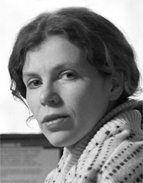 Yulia Latynina
Yulia LatyninaFormer Yukos CEO Mikhail Khodorkovsky turned 50 last week. He has spent 10 of those 50 years behind bars.
When he was first imprisoned in October 2003, the country was crippled by lawlessness and crime, but at the same time there was hope that Russia would someday turn for the better.
Now, however, Russia has slammed the door shut on opportunity. The country's most innovative and productive people are relocating to the West, and those who remain are dominated by the obedient, gray masses and the swelling ranks of siloviki and other state bureaucrats.
A "natural resource curse" occurs wherever an "alpha-male" satrap nationalizes the oil industry and uses the petrodollars to enrich himself and ensure his hold on power, not to develop the country. The leader's fear of political competition prompts him to weaken or destroy every other political and financial structure in the country apart from those under his direct control. The result is that the country is reduced to a mere pump that exports natural resources and imports everything else.
During the early 2000s, few spoke of a Russian resource curse. Russia was experiencing a meteoric rise, and new horizons were opening wide before it. And Khodorkovsky was at the top of Russia's boom. He was the first Russian oligarch to actually increase the value of his company by making it more transparent, effective and productive. He was also the first oligarch to fight for greater transparency in government institutions.
Of course, Khodorkovsky didn't do this out of the goodness of his heart. He understood that companies that had transparent operations were more attractive to individual shareholders and large global investment funds. As it turned out, though, Khodorkovsky' private interests matched those of the country at that time. In other words, what was good for Yukos was good for Russia.
Unfortunately, what was good for Russia was not good for President Vladimir Putin in the early 2000s. Putin had only one goal in mind: to transform the social order into something like a horde of chimpanzees. In such primate societies, the alpha male has the right to snatch away a banana or piece of meat from any honest chimpanzee that is lower on the pecking order. As a rule, the leader is most likely to get rid of chimps that he perceives as rivals.
Ten years ago, everybody thought Khodorkovsky would never be arrested because it would ruin Russia's investment climate. But as it became painfully clear after Khodorkovsky's imprisonment, Putin and his cohorts never cared about the investment climate anyway.
Khodorkovsky's arrest marked a turning point in Russia's modern history. For the past 10 years, the country has been heading down the slippery path that leads directly to Nigeria or Saudi Arabia.
Has Russia already passed the point of no return? Has the number of blindly obedient officials and citizens reached a critical mass that would make this country's rehabilitation a physical impossibility? Or could a revolution in thinking or a system of reforms eventually return Russia to its prior status, even if it took 10 or 20 years to accomplish?
I don't know the answers to these questions. But I do know that just as Khodorkovsky's arrest was the first step toward Russia's ruin, his release, if it ever happens, will be the first step toward its revival.
Yulia Latynina hosts a political talk show on Ekho Moskvy radio.
A Message from The Moscow Times:
Dear readers,
We are facing unprecedented challenges. Russia's Prosecutor General's Office has designated The Moscow Times as an "undesirable" organization, criminalizing our work and putting our staff at risk of prosecution. This follows our earlier unjust labeling as a "foreign agent."
These actions are direct attempts to silence independent journalism in Russia. The authorities claim our work "discredits the decisions of the Russian leadership." We see things differently: we strive to provide accurate, unbiased reporting on Russia.
We, the journalists of The Moscow Times, refuse to be silenced. But to continue our work, we need your help.
Your support, no matter how small, makes a world of difference. If you can, please support us monthly starting from just $2. It's quick to set up, and every contribution makes a significant impact.
By supporting The Moscow Times, you're defending open, independent journalism in the face of repression. Thank you for standing with us.
Remind me later.





